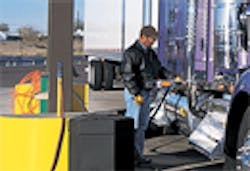“Increasing fuel economy is the easiest way to go green,” said Gerry Kirouac, training manager for Cadec Global, during the Environmental Protection Agency (EPA) SmartWay Transport Partnership and Cadec Global webcast titled “Top 5 Ways to ‘Go Green’ with Fleet Management.”
Kirouac and Buddy Polovick of the EPA office of transportation and air quality commented on methods of ‘greening’ fleets during the recent webcast.
According to Polovick, the issue has been amplified. “Green has truly gone mainstream in the popular media,” he said. “Fuel trends have everyone’s attention far more than before—it’s not just the prices, but the volatility that is causing so many problems for the industry…. the days of cheap energy are over.”
Kirouac noted that the biggest issues facing the industry are reducing C02 emissions, reducing idling time, getting peak performance out of vehicles, limiting deadhead miles and eliminating unnecessary drive miles.
The transportation industry contributes about 20% of greenhouse gases, Polovick said, traveling over 200 billion miles and burning over 55 billion gallons of fuel a year, and it continues to expand. “Growth in greenhouse gases from the US transportation sector had a 32% increase from 1990-2005, faster than any other sector,” he said.
In addition to the SmartWay program, Polovick noted that state and local authorities have begun to establish greenhouse gas reduction measures, such as the California Global Warming Act (AB32), which seeks to return to 1990 levels by 2020.
Polovick said several of SmartWay’s recommendations, such as low rolling resistance tires and advanced trailer aerodynamics can each lead to 5% or more fuel economy savings. “A combination of these technologies can make a SmartWay truck 20 to 25% more efficient than an average truck on the road today,” he said.
Anti-idling techniques were stressed heavily during the webcast as a necessity for greening fleets. “We estimate over 1 million gallons are wasted by unnecessary idling,” Polovick said.
“More and more states are requiring no-idle laws ranging from 2 to15 minutes with fines into the thousands of dollars,” Kirouac added. “Advanced truckstop electrification is cost-effective, cheaper than idling on a per-hour basis, while improving air quality.”
Kirouac commended the recent adaptation by several companies in the U.S. of two European initiatives. Waste from Electrical and Electronic Equipment (WEEE) involves customers sending obsolete or no longer functional materials back to the company free of charge to be recycled. Restriction of Hazardous Substances (ROHS) is a sister directive that bans non-green materials such as lead, cadmium, and mercury from a company’s products.
SmartWay is a collaboration between EPA and the freight industry aimed at increasing fuel efficiency and reducing greenhouse gases. Polovick said that the agency hopes to reduce 150 million barrels of oil, 33 to 66 million metric tons of C02 and 200,000 tons of NOx a year by 2012. They currently have over 640 partners, including carriers, shippers and railroads.
